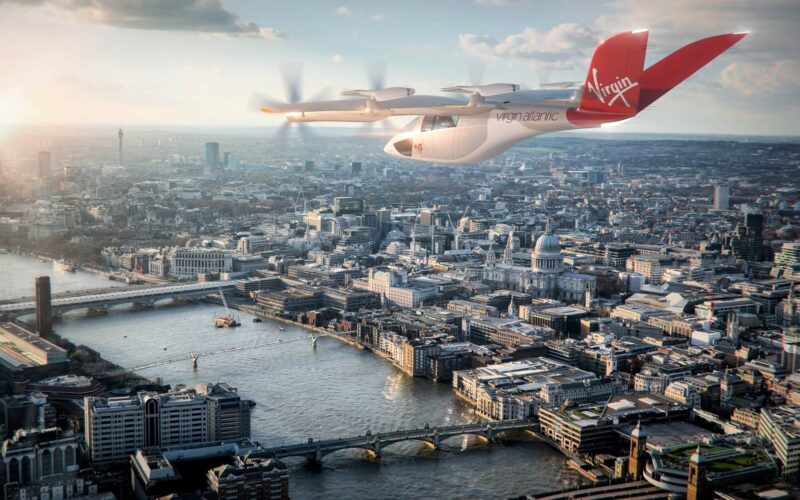Leading aviation companies have teamed up to work on bringing air taxi services to the United Kingdom, with Virgin Atlantic set to operate test flights of Vertical Aerospace’s eVTOL aircraft in 2024.
The consortium, which comprises engineering consultancy Atkins, Virgin Atlantic, Vertical Aerospace, the vertiport developer Skyports, and the main UK air navigation service provider NATS, announced on July 18, 2022, that it has received funding of £9.5 million ($11 million) from the UK government under the Future Flight Challenge.
The Advanced Mobility Ecosytem consortium plans to demonstrate how air taxis can work in commercial operations via two physical flight tests and a single simulation flight. The first two test flights will be made with Vertical Aerospace’s emission-free VX4 eVTOL aircraft, which will be operated by British air carrier Virgin Atlantic. The first flight is expected to take off from London Heathrow Airport (LHR) with a touchdown in the Living Lab vertiport built by Skyports, while the second test will take place between Bristol Airport (BRS) to an airfield in Southwest England.
Meanwhile, the third simulation flight will reflect urban connectivity possibilities by showing how eVTOL aircraft can operate between London City (LCY) and Bristol (BRS) airports. All three flight tests are scheduled to be performed gradually, starting in 2024.
The test flights should help the consortium and the UK government to explore the potential of the advanced air mobility (AAM) sector across the country. Demonstrations will also help to investigate key aspects of eVTOL aircraft operation, including the ground charging process, security provision, and the passenger journey.
Under the Future Flight Challenge program, UK aims to become one of the leaders in new forms of air travel and to establish its own AAM ecosystem in the upcoming decade.
“Our roadmap sets out how air taxis could be in use in the UK by 2030, but a lot needs to occur for that to happen,” the Future Flight Challenge Director at UK Research and Innovation, Gary Cutts, was cited as saying. “By bringing technical developments from across the aviation industry together into one network, and undertaking early demonstration in the real world, the Advanced Mobility Ecosystem Consortium could accelerate the timescale for AAM introduction by years. This project could revolutionize travel, not just in the UK but around the world.”

